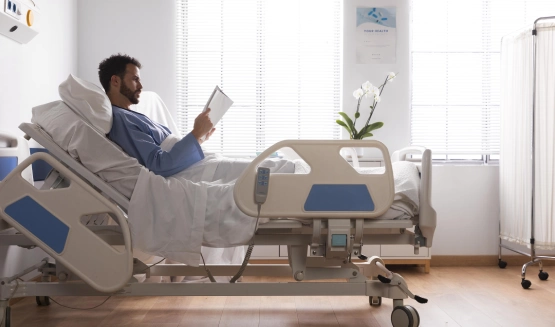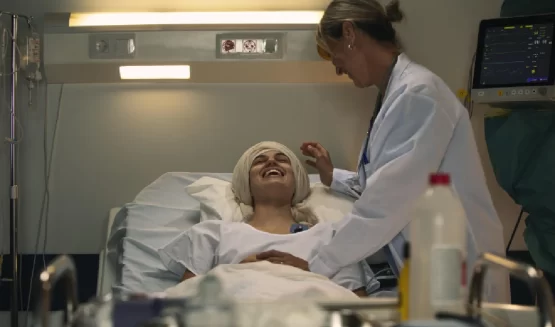Electric Hospital Cots: The Centerpiece of Patient Care and Comfort

A hospital cot is the centerpiece of all the equipment that is used in the care of a bedridden patient. With the healthcare industry evolving and introducing newer technologies to continually improve patient care, its efficiency, and overall ease of caregiving. Among the many innovations, electric hospital cots are a significant improvement, as they provide a combination of functionality, convenience, and better patient outcomes.
The Evolution of Hospital Cots
At first, hospital beds were manually operated, which required a considerable amount of physical effort just to adjust between the positions. This often was a big inconvenience to both the patient and the caregiver. This changed with the transition to electric hospital cots which worked as a result of advanced electronics and mechanical systems, which could be easily adjusted to a patient’s comfort with only a touch of a button. This led to a drastic improvement in the ability to attend to a patient’s needs quickly and effectively.
Key Features of Electric Hospital Cots
Electric hospital cots come with a selection of features designed to improve patient care and operational efficiency in healthcare settings. Some of the key features are as follows:
- Adjustable Positions: Electric cots can be adjusted to different positions, including the head, foot, and the height of the bed. This flexibility allows them to provide area-specific comfort to patients, especially bedridden patients with mobility issues or specific medical conditions.
- Ease of Use: With user-friendly controls, often including remote controls or integrated side panel buttons, adjustments can be done effortlessly by patients or caregivers.
- Safety Features: Modern electric cots are equipped with safety mechanisms such as side rails, emergency lowering functions, and battery backups to make sure of the patient’s safety during power cuts.
- Specialized Mattresses: Many electric cots are compatible with pressure-relieving mattresses, which are essential in preventing pressure ulcers, also known as bed sores, which is a common issue in long-term bedridden patients.
- Mobility and Stability: These cots are often equipped with lockable wheels, which provide both mobility and stability, which is an important feature needed during patient transfers and medical procedures.
Technological Advancements in Electric Hospital Cots
The combination of advanced technologies with electric hospital cots have drastically improved their functionality and effectiveness. Some of these technologies are given below:
- Smart Sensors: These sensors can monitor patient movements and vitals, alerting caregivers to potential issues such as prolonged immobility or abnormal vital signs. This helps in dynamic patient care management.
- Remote Monitoring and Controls: With the help of interconnected devices, caregivers can remotely monitor and adjust the bed’s settings, ensuring better patient comfort and care even from a distance.
- Integrated Communication Systems: Some electric cots are equipped with built-in communication systems, allowing patients to easily contact their caregivers or control other smart devices in their room.
- Customization and Memory Functions: Premium models of electric cots offer customization options where specific settings can be saved and restored as per preferences, ensuring personalized care to the patient.
The Impact on Caregivers
Electric hospital cots have significantly improved the workflow and efficiency of caregivers. Some of the more notable impacts are as follows:
- Time Efficiency: The easy adjusting of the bed positions means that caregivers can perform their duties more quickly, allowing them to attend to the patients more effectively.
- Focus on Patient Care: Less physical strain and time spent on manual adjustments allow caregivers to focus more on patient interaction and care, which can lead to better patient satisfaction and recovery.
- Training and Adoption: At first instance, adopting an electric cot may require training, but the long-term benefits like the ease of use and improved care standards make it a worthwhile investment for healthcare facilities.
Patient Experiences and Testimonials
Several patients have shared positive experiences with the use of electric hospital cots, highlighting the comfort and convenience they provide. Testimonials often mention the ease of adjusting positions without assistance, which adds to their sense of independence and dignity during hospital stays. Additionally, the reduction in pain and discomfort from long-term immobility has been a common theme in most patient feedback.
Future Trends and Innovations
 The future of electric cots is very promising, with the ongoing research and development aimed at bringing in more advanced technologies and features. Some of these potential future trends are as follows:
The future of electric cots is very promising, with the ongoing research and development aimed at bringing in more advanced technologies and features. Some of these potential future trends are as follows:
- Artificial Intelligence(AI): AI could be used to predict and automatically adjust bed positions based on patient needs and conditions, offering a higher level of personalized care.
- Improved Connectivity: Integration with hospital information systems could allow for smooth and easy sharing of patient data and bed settings, improving overall care coordination.
- Eco-Friendly Designs: With a growing focus on sustainability, future electric hospital cots may use eco-friendly materials and energy-efficient technologies.
- Virtual Reality(VR) Integration: VR technology could be integrated to provide immersive experiences for patients, aiding in pain management, relaxation, and even rehabilitation exercises.
Conclusion
The advancements in electric cots show significant growth in healthcare, providing a number of benefits to both patients and caregivers. Their ability to improve comfort, mobility, and guarantee safety makes them an essential part of modern medical care. As technology continues to evolve, electric cots are likely to become even more advanced, further revolutionizing patient care and hospital efficiency.
Incorporating electric hospital cots into healthcare facilities is not just an investment in technology, but an investment in patient well-being and the future of medical care. By welcoming these innovations, caregivers can ensure that they are providing the highest standard of care, improving patient recovery and conditions, and upgrading the overall healthcare experience.




